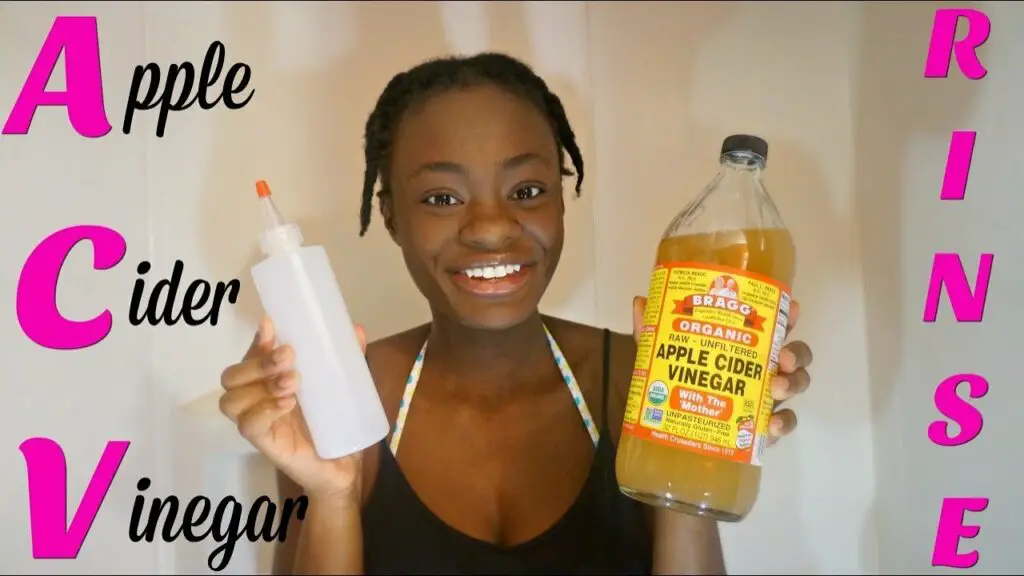
Why do I need an ACV rinse for 4C natural hair
Why do I need an ACV rinse for 4C natural hair? Apple cider vinegar rinses for natural hair have been gaining popularity among the natural hair community.
They have quickly gained a reputation as one of the best ways to clean and purify hair while getting rid of product buildup.
One of the many things that people tend to ignore is their hair and sebum pH levels. Sebum is the oil your scalp produces naturally.
The potential hydrogen, also known as the pH, needs to be between 4.5 and 5.5. If your pH is not within that range it can cause your hair to break off, become dry and will allow fungi and bacteria to grow on your scalp.
The pH levels in your hair can be tampered with using many of the products that are sold and stores and even some DIY products you may use.
Using an apple cider vinegar rinse shampoo, conditioner, or other product will help hair remain moisturized, prevent hair loss, thicken thinning hair, and help with hair growth.
It also makes the hair strands smoother and shinier. If your hair tends to break off or is dull and dry, an apple cider vinegar rinse can help prevent split ends and breakage.
What is apple cider vinegar?
Apple cider vinegar—or cider vinegar—is a vinegar made from fermented apple juice. “It is made by crushing apples, then squeezing out the juice, Bacteria and yeast are added to the liquid to start an alcoholic fermentation process, which converts the sugars from the juice to alcohol.
Then in a second and final fermentation step, the alcohol is converted into vinegar.” Apple cider vinegar contains antibacterial and anti-fungal properties that make it ideal for many uses ranging from cooking to health and beauty.
In a second fermentation step, the alcohol is converted into vinegar by acetic acid-forming bacteria Apple cider vinegar has no medicinal or nutritional value.
Some people say the “mother,” the cloud of yeast and bacteria you might see in a bottle of apple cider vinegar, is what makes it healthy.
These things are probiotic, meaning they might give your digestive system a boost, but there isn’t enough research to back up the other claims.
How to use AVC Rinse For 4c Natural Hair
- Use it as your shampoo: Who needs store bought shampoos when you’ve got good ol’ ACV! ACV is a particularly good idea if you’re sensitive to scents and if you have sensitive skin that reacts to the chemicals found in most shampoos. Use as much ACV as you’d like. I use 3/4 cup, undiluted. Remember to close your eyes or else the sting shall be all too real! Proceed accordingly with the rest of your regimen.
- Use it as your pre-final rinse: If you’ve used a very thick/oily deep conditioner and your hair feels gummy, use some ACV to lift some of the extra product that is sitting on your strands. I use about 3/4, undiluted, massage the product into your strands. Finish off with a cold rinse to shut your cuticles.
- Use it as your final rinse: To restore your hair’s pH back to 4.5, use diluted ACV – about 2 parts ACV and 1 part water. Rinse your hair with cold water, then follow through with one final ACV rinse.
- Either of these methods will leave your hair happy! It will be clean, and have lots of natural shine!
How Long To Leave ACV Rinse On Hair?
You may be wondering how long to leave apple cider vinegar on hair. It’s going to depend on your hair and the strength of the mixture but generally, a few minutes are all that are needed.
Diluted apple cider vinegar can be left on overnight. Because ACV seals the hair, it can be spritzed onto the hair every few days to add extra protection.
The key to achieving gorgeous results is in properly diluting the ACV for your hair type. Hair that has an average amount of oiliness will benefit from a two-tablespoon mixture.
Those with oily scalps will benefit from about four tablespoons. However, if you want to leave it overnight, it’s best to try fewer amounts at first and adjust the amount of ACV accordingly.
What avc can do for your hair?
It could potentially help ward off dandruff
ACV rinse for 4C natural hair has antibacterial and anti-fungal properties. The fungus is what causes dandruff. [ACV] contains malic acid which is what helps to keep the pH level of the scalp balanced.
Dandruff is a buildup on the scalp that happens when too much yeast is present on oily areas of the skin. Using a mix with ACV will help to avoid this build up on the scalp called dandruff.
Can possibly help with product build-up
Though they may seem like the same thing, dandruff is different than product build-up, which can happen as we wash our hair less often and rely on products like dry shampoo to last longer between washes.
Styling products can leave residue in hair apple cider vinegar is an alpha hydroxy acid so it helps to exfoliate the skin.
It also has a pH similar to the skin, so it helps to maintain a healthy pH balance of the skin and scalp, possibly helping to clarify your strands after days of gels, mousses, and sprays.
ACV is slightly acidic, Our hair is also naturally acidic from the oils and sebum from our scalp.
Hair products often disrupt the pH balance of our hair. When our hair is normal and in the slightly acidic range, the cuticle is smooth.
When we add hair products, many of these attach to our hair by opening the cuticle slightly by making the hair more alkaline. By using ACV, the normal acidity of our hair is restored and the product buildup resolves.
Try apple cider vinegar to ease scalp itchiness
There are several reasons why you might experience scalp itch, from dandruff to medical conditions like atopic dermatitis and psoriasis and others.
Though you should absolutely check in with your doctor or dermatologist for any unusual itching, ACV can help alleviate some of the itchiness, revealing that the apple cider vinegar helps to rebalance your scalp’s pH. Balancing the pH of your scalp will help reduce scalp itchiness.
ACV might help prevent hair loss and stimulate new hair growth
Adding apple cider vinegar to your hair care routine will help keep your scalp healthy by warding off bacteria and keeping a balanced pH level, this will stimulate hair growth. ACV gently exfoliates the scalp which in turn will promote hair growth and healthier hair.
Of course, any hair loss concerns you might have should be discussed with your doctor or dermatologist, but having a cheap, natural tool in your arsenal can’t hurt, as well.
It can help make hair feel smooth, soft, and shiny
Since we know that styling tools and products, as well as exposure to the elements, helps roughen up our hair’s cuticle, we’re often left with strands that feel dull or prone to tangles.
Apple cider vinegar helps to close the hair cuticle, In turn, your hair will be more manageable and much shinier. ACV helps to remove buildup on the hair, which will also boost shine.
Apple Cider Vinegar Benefits
There are many arguments for why this hip health condiment is great for your hair.
It could help boost the condition of your hair
If you have dry, brittle hair or an itchy scalp, replacing your usual shampoo with a bottle of unfiltered cider vinegar could give you more manageable tresses.
Research found that using high alkaline shampoos leads to hair breakage and dryness. The acetic acid in The Mother is thought to help lower our hair’s pH to combat that dry, frizzy feel.
Plus, raw cider vinegar is antimicrobial which means it may help control bacteria which leads to scalp itchiness.
Balance the hair pH
For one, apple cider vinegar — beyond having some well-researched health properties — is an acidic substance. It contains good amounts of acetic acid.
Hair that looks dull, brittle, or frizzy tends to be more alkaline or higher on the pH scale. The idea is that an acid substance, like ACV, helps lower pH and brings hair health back into balance.
Antimicrobial
ACV is also a popular home disinfectant. It may help control the bacteria or fungi that can lead to scalp and hair problems, such as minor infections or itchiness.
Other claims
Apple cider vinegar is praised for being rich in vitamins and minerals good for hair, like vitamin C and B. Some also claim it contains alpha-hydroxy acid which helps exfoliate scalp skin, and that it’s anti-inflammatory, which can help with dandruff.
Apple cider vinegar hair rinse before or after conditioner
Mix your tincture in an old hair-care bottle. Since you’ll be in the shower and distributing this throughout your head, you’re going to want to have a squeezable bottle.
Sure, you could try mixing it in a jar or glass, but you will have less control as you apply it throughout the scalp (plus, they tend to be heavier and easier to drop; you don’t want broken glass in your shower.)
Another easy option is a clean condiment bottle with a pointed nozzle to better get under the hair and directly on the scalp.
As a final packaging trick: Try an old spray bottle, like a non-aerosol hair-spray tube, so you can spray it on the scalp and hair in the shower. But don’t overthink it: Whatever you have around the house will likely suffice.
- If you have really oily hair and lots of buildup, use this after your shampoo for a deep clean. This will be too drying to do regularly, however. Only use this when you need to really clarify the scalp.
- If you wash your hair regularly and don’t typically have dry strands or scalp, consider swapping in a rinse one or two times a week in place of a wash and conditioner. This will help cleanse the hair, remove any buildup from product that your regular shampoo can’t get, and add shine as its laying the cuticle down flat. And remember: ACV is not a surfactant or soap, so it will not lather like your standard shampoos might.
- If you have dry hair, consider using this post conditioner or mask once a week instead of using a shampoo. We also recommend using a pre-shower hydrating hair mask, rinse that out, and then seal the cuticle shut with the tincture. This will make sure you get off any buildup or product.
- For really dry hair, you can also use this in place of your shampoo, and then follow with a conditioner. Just be sure to fully rinse your conditioner out post wash.
No one’s hair is exactly the same—plus individual hair and scalp changes with the environment, weather, and lifestyle.
So treat your hair like you do your face, and understand you’ll likely need to try a few ways out to find something that works for you.
Can i leave acv rinse in my hair overnight?
Why would you leave it in? Because an acidic environment is the best thing for your hair. It is what makes hair cuticles stay closed so there are not tangles.
Did I mention detangling isn’t a step I ever have to deal with in my haircare journey? Granted, I do take great measures not to let my hair tangle.
But if you see how easily my strands slide out of each other when I’m finger combing, and then you discover I have NO product on my hair whatsoever, but I’m working with bare hair that had its very last contact with an ACV solution, then you know that perhaps leaving it in is indeed a very smart thing to do.
Can you use the acv rinse before coloring hair?
apple cider vinegar is safe for all hair types, including color-treated hair. If you’re looking for a solution for how to remove buildup from color-treated hair (but don’t want to strip your hair of its color over time), you’ve found it in ACV.
Apple cider vinegar rinses are really truly about removing buildup of products, and they make the hair really clean. Apple cider vinegar, while being acidic, is only slightly so—just enough to balance the pH of your hair (and scalp), not strip it.
And because it’s a chelating agent (the thing responsible for making your hair lather up), it has the ability to grab the minerals and metals (mostly from hard water) that build up and dull your hair.
Apple cider vinegar coats the cuticle, leaving the hair soft and shiny, It also helps to strengthen your hair by closing the cuticles and the hair shaft. Shiny hair, healthy scalp, and unclogged hair follicles—it’s an all-around do.
All this to say, because ACV is slightly acidic, when it’s mixed with two to three parts water it may extend the life of hair color, but only when applied right after the color is rinsed off.
Most hair colors are alkaline, which opens up the hair cuticle, and applying an acidic solution may reseal the cuticle.
Can you use acv rinse to seal hair dye?
I have dyed tips and usually use vinegar when I wash. But what helps most for keeping the colour from fading is obviously stretching washes as much as you can. I also add a bit of dye to my conditioner.
And I try to use diluted shampoo or to wash with conditioner; harsh shampooing obviously strips the color a lot.
Use the acv rinse for hard water
One do-it-yourself solution for protecting your hair against hard water is to use a vinegar rinse.Because vinegar is acidic, it works to remove the scaly buildup of minerals like magnesium and calcium from your hair.
Distilled white vinegar will work; however, the preferred type for this rinse is apple cider vinegar. To create a vinegar rinse, simply combine 1 tablespoon of vinegar with 3 cups of water.
Apply this concoction close to the scalp after shampooing and allow it to sit for a few minutes before rinsing it. To retain the moisture in your hair, apply this rinse once a week.
The takeaway – ACV rinse for 4C natural hair
Why do I need an ACV rinse for 4C natural hair. It could help strengthen hair and improve luster by lowering hair and scalp pH.
It may also keep pesky scalp infections and itchiness at bay. However, it shouldn’t be relied on to reduce inflammation or solve diseases or issues of the scalp, like dandruff.
Everyone’s hair is different. Apple cider vinegar rinses may not work for everyone. The best way to know if it’s beneficial for you is to bring it into your hair care routine, and see if it works for you personally.


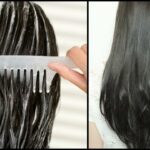

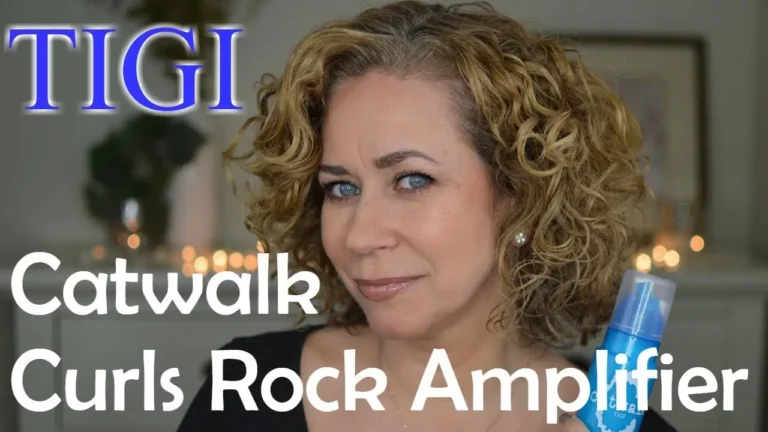
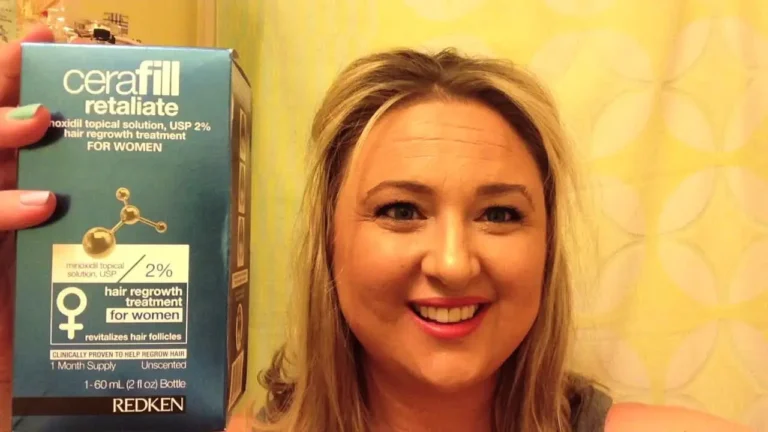
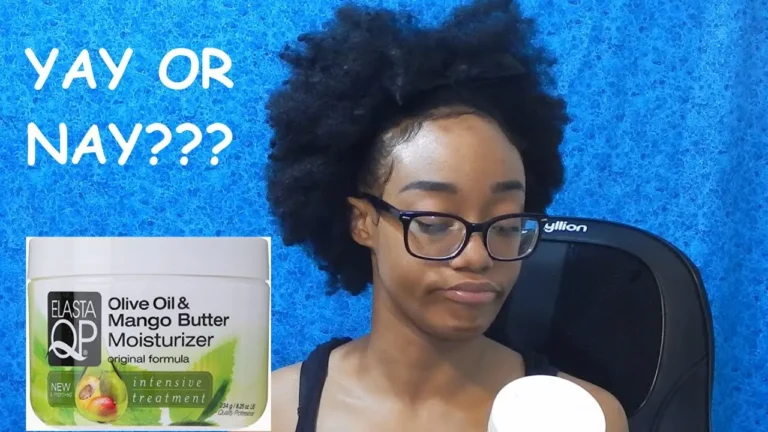

Comments are closed.